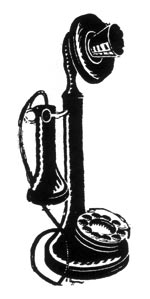|

This story was published in Radio Recall, the journal of the Metropolitan Washington Old-Time Radio Club, published six times per year.
Click here to return to the index of selected articles.
|
|
 THE LITTLE LADY THE LITTLE LADY
WHO COULD LOCATE ANYBODY:
Doris Sharpe of Radio Registry
A short history by Jack French, © 2004
(From Radio Recall, February 2005)
Long ago in the annals of OTR, before the advent of pagers, answering machines, and cellular telephones, one of the most daunting tasks in radio broadcasting was locating and keeping track of the performers. With literally dozens of producers trying to find hundreds of actors, communication was frantic, uncertain, and disorganized.
In the 1930s, radio’s secretaries tried to be aware of where actors were at any given time, but with most of the performers racing from studio to studio, it was nearly impossible. Producers had trouble finding the actors they wanted for a particular show, and even when they did, the actor might have a conflicting rehearsal or performance. Actors, chosen in auditions, might not learn of it in time to accept the role. And, once performers left for work in the early morning, their families had no way to contact them all day unless the actor used a pay phone to call home.
Doris Sharpe, a bright young lady, began working as a receptionist at CBS Radio in New York City in 1930, and over the next eight years, got to know most of the producers, directors, and actors who passed her desk. She reminded them of rehearsals, took phone messages for them, and relayed these as promptly as possible.
By 1938 Doris was convinced that Manhattan radio actors needed a message service that could handle most of the duties that she and many other secretaries were trying to do separately. With the encouragement of two CBS directors, Irving Fein and Brewster Morgan, she transformed her idea into reality.
In November 1938, Doris prepared a draft proposal in which she offered actors a complete messaging service for which she would charge them $4.50 a month. A cast member of The March of Time saw her draft, took it into rehearsal, and later returned it with nearly the entire cast asking for representation.
Doris quit her job at CBS, emptied her savings account of $300, rented part of a small office, and had the phone company install a monitor board, with a night line in her apartment. With 18 clients to start, Doris was in business, which she named “Radio Registry.” For $4.50 a month, she received and relayed all calls of performers, as well as kept track of their shows and rehearsals, so she could accept roles for them, even it they couldn’t be immediately located. Doris became their own personal secretary and passed messages from their employers and their families.
Radio Registry in the next few years grew tremendously because Doris not only provided an essential service, but she did it so well. By 1948, her number of clients had risen to over a thousand and Radio Registry employed 14 women full-time at their switchboards. During WW II, the demand for her services on the West Coast resulted in the formation of a Radio Registry in Hollywood. Within two years, her six employees there were handling the messages of over 300 performers in the Los Angeles area.
By then, Doris had raised her monthly charge to $9 a month but all performers still considered it a bargain. The initial life savings of $300 Doris had withdrawn in 1938 would eventually make her a very wealthy business woman.
She continued to see related business opportunities, setting up direct phone lines from sponsors to their advertising agencies, even coast to coast. Later she created another subsidiary called “I’m Casting” which provided lists of suitable and available actors to all producers of new shows.
But the bulk of Radio Registry’s business would continue to be the performers’ message service. Hundreds of incoming and outgoing messages were logged and transmitted very hour by Doris and her corps of efficient operators. On the business cards of most radio actors, there was only one telephone contact: “Lackawanna 4-1200, Radio Registry.”
|